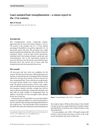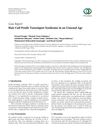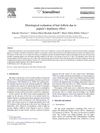85 citations,
June 1999 in “Dermatologic Surgery” The long-pulsed alexandrite laser is safe and effective for hair reduction.
31 citations,
February 1999 in “Dermatologic surgery” Sun exposure after laser hair removal can cause skin darkening, which is hard to treat and requires avoiding UV light.
 17 citations,
February 2013 in “PLOS ONE”
17 citations,
February 2013 in “PLOS ONE” 6-Gingerol, found in ginger, may slow down hair growth and could be used for hair removal.
 11 citations,
June 2005 in “Journal of Cosmetic Dermatology”
11 citations,
June 2005 in “Journal of Cosmetic Dermatology” Lasers in hair transplantation show promise but are not yet standard, with current methods causing some side effects and needles still being preferred for creating recipient sites.
 September 2024 in “Electronic Journal of General Medicine”
September 2024 in “Electronic Journal of General Medicine” Laser hair removal can cause severe skin irritation, but it can improve with treatment.
90 citations,
February 2000 in “Dermatologic Surgery” Alexandrite laser hair removal is safe for darker skin tones.
 24 citations,
September 2014 in “Drug Delivery”
24 citations,
September 2014 in “Drug Delivery” Using microneedles before applying eflornithine cream can make it more effective at stopping hair growth.
21 citations,
April 2019 in “Journal of cosmetic and laser therapy” Laser hair removal is popular for long-term hair reduction but carries risks, requiring well-trained operators and better regulations, especially in South Africa.
 1 citations,
January 2021 in “Journal of Dermatology and Dermatologic Surgery”
1 citations,
January 2021 in “Journal of Dermatology and Dermatologic Surgery” Taking Vitamin D supplements may increase the risk of skin darkening after laser hair removal.
 September 1998 in “JEADV. Journal of the European Academy of Dermatology and Venereology/Journal of the European Academy of Dermatology and Venereology”
September 1998 in “JEADV. Journal of the European Academy of Dermatology and Venereology/Journal of the European Academy of Dermatology and Venereology” The document concludes that individualized treatments for hair issues are effective, certain hair changes can indicate neurocutaneous diseases, specific lotions improve skin health, laser hair removal works but needs more study on long-term effects, men's cosmetics are diverse, peeling is effective but can have side effects, and facial pigmentation is often due to overactive skin cells.
 28 citations,
July 2011 in “Journal of Plastic Reconstructive and Aesthetic Surgery”
28 citations,
July 2011 in “Journal of Plastic Reconstructive and Aesthetic Surgery” A patient had skin tissue death at the hair removal site after a hair transplant, which was treated with surgery.
 9 citations,
May 2020 in “Journal of Cosmetic Dermatology”
9 citations,
May 2020 in “Journal of Cosmetic Dermatology” Hair restoration surgeons have improved follicular unit excision (hair transplant method) by using innovative tools and techniques, reducing hair damage and increasing success rates.
 4 citations,
January 2015 in “Case reports in urology”
4 citations,
January 2015 in “Case reports in urology” An 8-year-old boy recovered from a rare case of penile tourniquet syndrome after hair removal surgery.
 1 citations,
January 2017 in “Elsevier eBooks”
1 citations,
January 2017 in “Elsevier eBooks” The document concludes that new treatments for hair loss may involve a combination of cosmetics, clinical methods, and genetic approaches.
 53 citations,
April 2018 in “Journal of The American Academy of Dermatology”
53 citations,
April 2018 in “Journal of The American Academy of Dermatology” Cancer treatments often cause hair disorders, significantly affecting patients' quality of life, and better management methods are needed.
 51 citations,
January 2004 in “Skin Pharmacology and Physiology”
51 citations,
January 2004 in “Skin Pharmacology and Physiology” The document explains hair growth and shedding, factors affecting it, and methods to evaluate hair loss, emphasizing the importance of skin biopsy for diagnosis.
 77 citations,
April 1999 in “Dermatologic Clinics”
77 citations,
April 1999 in “Dermatologic Clinics” The document concludes that follicular unit transplantation offers more natural results and better graft survival than older hair transplant methods.
 24 citations,
March 2015 in “Dermatologic Surgery”
24 citations,
March 2015 in “Dermatologic Surgery” Home-use cosmetic laser and light devices show modest results for hair removal and acne treatment, but more research is needed for confirmation.
December 2005 in “Springer eBooks” Laser hair removal is generally effective, with results varying by laser type and patient.
 112 citations,
July 1998 in “Journal of Investigative Dermatology”
112 citations,
July 1998 in “Journal of Investigative Dermatology” Ruby laser pulses best destroy hair follicles during the growth phase and effectiveness varies with laser intensity; melanin is key for targeting, and timing treatments can improve results.
 13 citations,
January 2007 in “International journal of pharmaceutics”
13 citations,
January 2007 in “International journal of pharmaceutics” Papain cream removes hair better than papain gel, causing hair follicles to widen and skin to thicken.
 6 citations,
April 2012 in “Lasers in surgery and medicine”
6 citations,
April 2012 in “Lasers in surgery and medicine” Laser hair removal can cause a severe itchy rash in some allergic individuals, treatable with steroids.
 101 citations,
June 2005 in “Journal of The American Academy of Dermatology”
101 citations,
June 2005 in “Journal of The American Academy of Dermatology” Very few people experience increased hair growth after laser hair removal, especially those with darker skin and black hair.
 83 citations,
January 2015 in “World Journal of Stem Cells”
83 citations,
January 2015 in “World Journal of Stem Cells” Hair follicle regeneration needs special conditions and young cells.
 60 citations,
December 2015 in “Clinical and experimental dermatology”
60 citations,
December 2015 in “Clinical and experimental dermatology” Laser hair removal improves quality of life but emotional benefits decrease over time, suggesting more treatments are needed for lasting effects.
 9 citations,
May 2021 in “Archives of Dermatological Research”
9 citations,
May 2021 in “Archives of Dermatological Research” Home-based skin care devices are generally safe and effective for hair removal, promoting hair growth, treating wrinkles and acne, but results for psoriasis treatment are mixed.
 7 citations,
August 2016 in “Nursing for Women's Health”
7 citations,
August 2016 in “Nursing for Women's Health” To prevent and treat Hair-thread tourniquet syndrome in infants, keep a close eye on their limbs, manage maternal hair loss, and educate parents and healthcare providers.
 7 citations,
March 2016 in “Journal of Cosmetic and Laser Therapy”
7 citations,
March 2016 in “Journal of Cosmetic and Laser Therapy” Home-use lasers and IPL devices are unlikely to directly cause paradoxical hair growth; it may be linked to inflammation or hormonal issues.
 2 citations,
June 2022 in “International Journal of Biomedicine”
2 citations,
June 2022 in “International Journal of Biomedicine” The review suggests a comprehensive approach to treat hirsutism, focusing on hair removal, medication, and managing emotional effects.
 January 2024 in “Frontiers in Bioengineering and Biotechnology”
January 2024 in “Frontiers in Bioengineering and Biotechnology” A new method using stem cell membranes to deliver Minoxidil improved hair growth in mice better than Minoxidil alone.
























